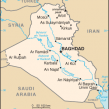
Militants Ask Whether Jihad is Defeated in Iraq
Publication: Terrorism Monitor Volume: 7 Issue: 6
By:

Prompted by a question posted in a jihadi internet forum, members discussed the current and future prospects of jihad and jihadi factions in Iraq. Special attention was given to the direction of the jihad movement after the scheduled withdrawal of part of the American occupation force (alboraq.info, March 9). Some forum members believe the jihadis have lost the war in Iraq and are moving on to Afghanistan. Others who claim involvement in jihad operations allege the mujahideen are intentionally decreasing insurgent operations in preparation for a takedown of Baghdad’s “Green Zone” following the American pullback.
Forum member Abu Mansur al-Filastini began the discussion by asking; “Is jihad lost in Iraq?” The recent absence of serious jihadi operations, communiqués claiming terrorist attacks and the announcement of the U.S. partial withdrawal (which indicates a retraction of jihad) are the reasons given for raising the question at this time. Al-Filastini suggests that, if jihad is in decline in Iraq, it is due to the jihadis’ lassitude and not because of a U.S. triumph over jihadis in Iraq. In Afghanistan, the Taliban was defeated militarily but not ideologically, therefore the movement made a strong return. Al-Filastini believes the mujahideen in Iraq should admit failure and learn from their mistakes. Members who agreed with al-Filastini attribute the jihadist defeat to dissension among various jihadi groups, in particular the rivalry between the so-called Islamic State of Iraq (ISI), the Jihad and Reform group, the Jihad and Change group and the Supreme
Command and Liberation Group.
Some forum participants asked why the mujahideen prevailed in Afghanistan over the Soviets but failed in Iraq. Forum member al-Fata al-Nabhani insisted the Western world not only supplied weapons and funds for the mujahideen to fight the Soviets, but also instructed their allies in the Gulf states to send mujahideen to avenge Moscow’s backing of the Vietnamese against the United States. However, the seven main Afghan jihadi groups turned against each other after the Soviet withdrawal and it was not until they united under one flag that they regained control of Afghanistan. Similarly, al-Nabhani called upon Iraq’s jihad groups to unite under one flag to be able to defeat the Americans: “The belief that the mujahideen’s victory is looming in Iraq is a tattered, false assumption… Jihad has been gravely defeated.”
More optimistic forum members responded by insisting the mujahideen have not lost and the decrease in attacks is only the calm that precedes the storm. The mujahideen are regrouping and their endeavors will bear fruit soon. “Out of experience in warfare and jihad, I assure you the battle has [only] just begun,” says a member nicknamed Siyyaf, who added that the mujahideen Amirs and cadres are regrouping and preparing for the next phase of the struggle while awaiting the withdrawal of U.S. troops. These preparations include the procurement and caching of weapons, the recruitment of new mujahideen and the collection of intelligence. The next phase will commence with the surrounding and taking of the Green Zone in Baghdad, which houses government offices, foreign embassies and U.S. military facilities. Until this phase begins, the mujahideen are not idle, but are rather waging a war of attrition, as manifested in the current hit-and-run terror attacks.
Other optimists believe the United States lost the war in Iraq a year ago by failing to achieve their military objectives, thus draining available resources and breaking their morale. Many jihadist groups in Iraq are aware of the serious threat posed to them by the U.S.-armed and funded tribal Awakening councils, which include many former jihadis. They urge the mujahideen to intensify their use of “stick-bombs” (an explosive device with a magnet that allows it to be “stuck” onto a target’s vehicle) against the chiefs of those Sunni tribes who are influential in the Awakening Councils. Jihadis claim such a technique was used to kill an Awakening council leader in early March 2009 (al-faloja.info, March 8).
Other members who also claim to be involved in jihad assert that the mujahideen are concentrating on collecting intelligence pertinent to sensitive hard targets in order to salvage the public endorsement they lost through a focus on soft targets that resulted in massive civilian casualties. Members claim the ISI is adapting a new three-step strategy inspired by an audio lecture recorded by Shaykh Yusuf al-Ayyiri, a former Saudi al-Qaeda leader who was killed by Saudi security forces in 2003:
1) “Fake Defeat and Demise” – In this phase, jihadis would pretend they lost all capability of perpetrating further attacks to ease the urgency of the enemy’s pursuit of its members.
2) As a consequence of the success of the first step, the enemy would brag about its “victory” over the insurgents. Once the enemy concluded the jihad was over, it would be easy for jihadis to penetrate the enemy’s ranks and hit it from inside. To preserve the jihadi cadres, the mujahideen should not attempt to hold onto liberated areas.
3) Jihadis would refrain from publicizing insurgency operations in certain areas until all jihadis had the chance to evacuate these areas completely.
Despite all the explanations and assertions of jihadi preparations to regain control after the reduction in U.S. forces in Iraq, facts on the ground indicate the Iraqi jihadis are losing ground to the U.S.-trained legitimate Iraqi forces. A further indication of their difficulties is the flight of the muhajireen (non-Iraqi jihadis) who once poured into Iraq to fight the Americans.





